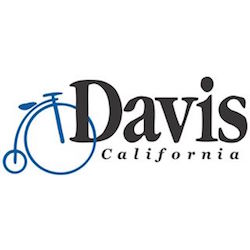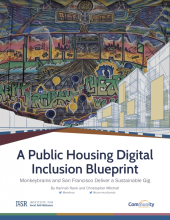
Fast, affordable Internet access for all.

On July 9th, Christopher will be in Palo Alto, California, for a talk on municipal networks and the possibilities as the city searches for better connectivity. Organizers from Muni Fiber Palo Alto will also host a screening of the documentary "Do Not Pass Go." Attendees will have the opportunity to ask questions at the end of the presentation.
Details for the event:
Muni Fiber Palo Alto - How and Why
July 9, 2019 at 7 p.m.
Mitchell Park Community Center
3700 Middlefield Road
El Palo Alto Room West
Palo Alto, California
Google map to the event location
Long Road to Change
For about two decades, Palo Alto has contemplated the possibilities of a municipal fiber optic network. We recently shared an opinion piece by Jeff Hoel, who moved to Palo Alto years ago, in part because he thought the community was sure to invest in citywide Fiber-to-the-Premise (FTTP) infrastructure. As a retired electrical engineer, the ability to get the best connectivity has always been a priority for Jeff. He's still waiting for the city to deploy fiber citywide.
Palo Alto currently leases out dark fiber, generating revenue that goes into a fiber optic fund. With approximately $26 million stashed away so far, Jeff and others are asking Palo Alto to move beyond feasibility studies or private sector partner searches, and build a municipal network. Launching Muni Fiber Palo Alto was one of the first steps to stirring local support; public information meetings like the one on July 9th will also help grow interest.
In an April press release, SiFi Networks announced that they will be developing a privately funded open access Fiber-to-the-Home (FTTH) network in Fullerton, California. The project will serve the city of approximately 140,000 people, with ISPs using the SiFi fiber network to compete for subscribers.
Getting Commitments
SiFi approached Fullerton in 2013 after the city’s bid to bring Google Fiber to town didn’t succeed. City leaders were interested in the prospect of bringing a FTTH network to the community as an economic development tool and, after bringing the proposal to the city council, decided they wanted to work with SiFi. The project aligned with several aspects of the community’s Fullerton Plan, a revitalization and economic development master plan.
As part of the discussions, SiFi informed Fullerton that they would wait to begin construction until after 25-year Right-of-Way (ROW) permits were granted and the company had obtained lease agreements from ISPs who wanted to offer Internet access via the network. As part of the arrangement, SiFi planned to pass every premise, regardless of what type, by the end of 2021. In January 2014, the Fullerton City Council authorized the City Manager to enter into a Negotiation Agreement (NA) with SiFi Networks. Since that time, both parties have been working to fulfill the necessary steps to move ahead with construction.
Now that funding is in place, ISPs have committed, and permits are prepared, both parties are ready to begin the project.
 SiFi will use a microtrenching method to install most of the conduit and will begin with what they call the “pilot phase” located in the southwest corner of the city. SiFi will take the opportunity to refine installation and delivery techniques, allowing the company to more efficiently deploy in the remaining zones around the city. Microtrenching is one of the tools SiFi uses as part of their FOCUS system of deployment.
SiFi will use a microtrenching method to install most of the conduit and will begin with what they call the “pilot phase” located in the southwest corner of the city. SiFi will take the opportunity to refine installation and delivery techniques, allowing the company to more efficiently deploy in the remaining zones around the city. Microtrenching is one of the tools SiFi uses as part of their FOCUS system of deployment.
Project Development and Funding
Finding the right moment to move forward with a publicly owned broadband infrastructure investment isn’t always cut and dry. Davis, California, has considered the possibilities for the past three years and at the June city council meeting, decided to assign city staff the task of examining the details of an incremental fiber optic network deployment. “We can’t approve a municipal fiber network today,” Councilman Will Arnold said, “but we can kill it, and I’m not willing to do that.”
Broadband Advisory Task Force
Davis’s Broadband Advisory Task Force (BATF) recommended to the city council that Davis move forward with developing a fiber optic network. The task force has examined the issue since it was formed in 2016, at the urging of citizens who formed a group calling themselves DavisGIG. The group’s main purpose has been to encourage the city to begin the process of examining the possibility of developing a Fiber-to-the-Home (FTTH) network.
The city hired Finley Engineering and CCG Consulting, which worked together to deliver results of a feasibility study with recommendations in March 2018. They concluded that a citywide build out funded completely with one bond issue wasn’t feasible. In their opinion, Davis would require additional funding, such as sales tax or property taxes. Citywide deployment, which consultants estimate to be around $106.7 million, would be high due to poor pole condition, labor costs, and high housing density. An incremental approach, however, is a goal that Davis should consider.
Read the feasibility study here [pdf].
 Still Needed
Still Needed
Named the Intelligent Community of the Year by the Intelligent Communities Forum in 2012, Riverside, California has continued to work toward broadband expansion, digital inclusion and take full advantage of their fiber optic infrastructure. To offer more options for commercial and institutional entities in the community, the city council approved a dark fiber leasing program to be operated and maintained by Riverside Public Utilities (RPU). Officially launched in 2018, the program makes the city’s 120-mile dark fiber network available for Internet service providers (ISPs), wireless operators, and mobile carriers to lease and provide service to industrial and commercial customers.
Becoming an Innovation Hub
Riverside’s growing reputation as a smart city has helped turn the community into a hub for start up companies, especially in the technology industry. Located just east of Los Angeles, Riverside was ranked as 19th on MSN Money’s list of the best cities in the U.S. to grow a business and several large companies, such as SolarMax, have recently located there.
While the fiber network was originally constructed for running the operational facilities of power and water, the city had the foresight to finance and construct fiber to every city facility. With the new leasing program, this original network is now an essential backbone for providing the city’s businesses and industries with the high-speed service they need to compete with surrounding communities.
Open for Business

This spring, SiFi Networks and Fullerton, California, announced that they will be working together to deploy an open access Fiber-to-the-Home (FTTH) network across the city of 140,000 people. SiFi will fund and build the network and has already signed up two providers to offer Internet access service to the public. This week, Christopher speaks with Ben Bawtree-Johnson, CEO of SiFi Networks.
Ben and Christopher discuss the plan, the company, the partnership, and the project. They talk about the advantages of encouraging competition wherever the market allows and other reasons for advancing the open access model. In addition to encouraging multiple ISPs in the community, the infrastructure will allow smart city applications and innovation to thrive.
Project construction will include microtrenching, a method that SiFi feels confident will work in Fullerton and considers key to the deployment schedule. Ben provides some detail on the project's “three-layer” open access model that will include a separation of infrastructure, operations, and provision of services.
Learn more about the different open access models on our open access page.
This show is 25 minutes long and can be played on this page or via Apple Podcasts or the tool of your choice using this feed.
Transcript below.
We want your feedback and suggestions for the show-please e-mail us or leave a comment below.
Listen to other episodes here or view all episodes in our index. See other podcasts from the Institute for Local Self-Reliance here.
Thanks to Arne Huseby for the music. The song is Warm Duck Shuffle and is licensed under a Creative Commons Attribution (3.0) license.
During the 20-year on-again-off-again relationship between Palo Alto and a possible fiber optic municipal network, the people of the community have waited while plans have changed, leadership has shifted, and city staff has researched potential infrastructure plans. For the people of the city, it’s a long time to be patient. In a recent opinion piece, resident Jeff Hoel described his long wait and expressed why his city needs to finally move forward and create a citywide municipal Fiber-to-the-Premises (FTTP) network.
Knows of What He Speaks
As a retired electrical engineer who has intimate knowledge of technology and networking, Jeff writes in his piece that one of the reasons he moved to Palo Alto in 1998 was because the city was considering deploying a community network. At the time, Palo Alto had already invested in dark fiber, which they have used to generate approximately $2.1 million per year through leases. The revenue has been held in a fiber optic fund, which has grown to around $26 million.
Over the years, the city has commissioned studies and community leaders have publicly advocated for an expansion of the network to a citywide utility for residents and businesses. Palo Alto’s residents have supported the idea, but stumbles in securing funding, difficulties locating private sector partners for a P3, and a failed bid to bring Google to town, have all left the city with no fiber optic network.
At a Lancaster City Council meeting on May 14th, community leaders voted unanimously to take a step toward establishing several municipal utilities, including a publicly owned fiber optic network.
Good Experiences with Their Public Utility
Lancaster Choice Energy (LCE) is the city’s municipal electric utility, but in the future may be one of several publicly owned utilities. LCE has a Community Choice Aggregation (CCA) program, which allows individual users within the community to join together for purchasing power and gives them more control over matters such as the source of their energy. Lancaster wants to become a net-zero city and is exploring a range of approaches to reach that goal.
The community also underwent traffic signal upgrades like many other California communities and has installed additional fiber as the city has started to implement Smart City initiatives. At the city council meeting, City Manager Jason Caudle noted that using the fiber optic assets to develop a community network was a strong possibility.
In an article in the Antelope Valley Press published prior to the meeting, Caudle also noted that they plan other uses for the fiber, “As part of our smart cities effort, we’ve installed fiber-optic networks already throughout our city, and then we’re looking at putting our streetlights into Wi-Fi hotspots as well as 5G networks,” he said.
In his report to the council, Caudle wrote:
The establishment of a municipal utility is the next step in continuing to ensure that citizens and businesses are provided with utility services that meet the current and future needs of the community. As a municipal utility, Lancaster will have the opportunity to utilize advanced technology, provide utility services at rates and charges that are fair and reasonable, provide high quality customer service, and provide alternatives to existing providers of utility services similar to what the City achieved through the development of the City’s CCA.

Local communities continue to search for ways to tackle the digital divide and in San Francisco, the city is making strides by working with a local Internet access company. The City by the Bay and ISP Monkeybrains have adopted a new model to bring high-quality connectivity to residents in public housing. The approach not only creates new opportunities for people who were once denied economic and educational opportunities, but does so in a way that is financially self-sustaining. With modest maintenance and start-up costs, Monkeybrains and San Francisco has found a way to bring the same high-speed Internet access to low-income households at an affordable rate. Read our new report, A Public Housing Digital Inclusion Blueprint: Monkeybrains and San Francisco Deliver a Sustainable Gig, to learn how the partners found a way to shrink the digital divide in public housing facilities.
Download A Public Housing Digital Inclusion Blueprint: Monkeybrains and San Francisco Deliver a Sustainable Gig [pdf], here.
Lessons for More Communities
Every community, regardless of population, must contend with digital inequity. As local communities continue to recognize all residents’ need for high-quality Internet access, models such as the approach developed by Monkeybrains and San Francisco spark further innovation.
From Christopher:
“These households need Internet access to search for jobs, improve their education, access government services, and for many other reasons common to modern living. Monkeybrains' work in San Francisco shows how smart one time investments in public housing can guarantee high-quality access to all in public housing.”
Local communities continue to search for ways to tackle the digital divide and in San Francisco, the city is making strides by working with a local Internet access company. The City by the Bay and ISP Monkeybrains have adopted a new model to bring high-quality connectivity to residents in public housing. The approach not only creates new opportunities for people who were once denied economic and educational opportunities, but does so in a way that is financially self-sustaining. With modest maintenance and start-up costs, Monkeybrains and San Francisco has found a way to bring the same high-speed Internet access to low-income households at an affordable rate. Read our new report, A Public Housing Digital Inclusion Blueprint: Monkeybrains and San Francisco Deliver a Sustainable Gig, to learn how the partners found a way to shrink the digital divide in public housing facilities.
Download A Public Housing Digital Inclusion Blueprint: Monkeybrains and San Francisco Deliver a Sustainable Gig [pdf], here.
A few national ISPs offer programs for households considered low-income, but those services only offer slow and typically unreliable connections. The program that Monkeybrains and San Francisco has created provides high-speed Internet access to public housing units at no cost to the end user. In some cases, the ISP does receive a monthly payment of $10 per unit from building management. No matter what, each user receives the same level of customer service and support as those who pay standard monthly rates. From the beginning, the goal was to bring the same level of service to subscribers in public housing as Monkeybrains subscribers throughout the city.
In recent years, an increasing number of local communities have started looking into the possibilities of developing broadband infrastructure. One of the reasons they often cite for their investigations is the desire to increase competition for broadband services. In California, public interest groups recently put out the alarm about AB 1366, a bill introduced in February that will strengthen the power of monopolies in the state.
Wrong Direction
The Electronic Frontier Foundation (EFF) posted an article about the bill in March, in which they described AB 1366 as a state-level version of “the Federal Communications Commission’s lead to abandon oversight over a highly concentrated, uncompetitive market.”
AB 1366 removes the 2019 sunset from a bill passed last year that prohibits state or local governments from taking any steps to regulate or create standards for VoIP or broadband services (“Internet enabled services”). The ban on state and local “laws, rules, regulations, ordinance, standards, orders or other provisions” will be permanent if AB 1366 passes. California will relinquish oversight of the activities of the major national Internet access companies, such as AT&T and Comcast, putting all trust in these companies and removing local and state authority.
Bad News for New Entrants
If California denies itself and its local governments the ability to make policy changes, it will also prevent cities from taking action to encourage new entrants into the marketplace. Californians will suffer and monopoly providers will gain by removing the power to increase choice.